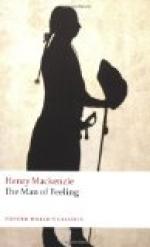At supper his aunt observed that he was graver than usual; but she did not suspect the cause: indeed, it may seem odd that she was the only person in the family who had no suspicion of his attachment to Miss Walton. It was frequently matter of discourse amongst the servants: perhaps her maiden coldness—but for those things we need not account.
In a day or two he was so much master of himself as to be able to rhyme upon the subject. The following pastoral he left, some time after, on the handle of a tea-kettle, at a neighbouring house where we were visiting; and as I filled the tea-pot after him, I happened to put it in my pocket by a similar act of forgetfulness. It is such as might be expected from a man who makes verses for amusement. I am pleased with somewhat of good nature that runs through it, because I have commonly observed the writers of those complaints to bestow epithets on their lost mistresses rather too harsh for the mere liberty of choice, which led them to prefer another to the poet himself: I do not doubt the vehemence of their passion; but, alas! the sensations of love are something more than the returns of gratitude.
Why steals from my bosom the sigh?
Why fixed is my gaze on the ground?
Come, give me my pipe, and I’ll try
To banish my cares with the sound.
Erewhile were its notes of accord
With the smile of the flow’r-footed
Muse;
Ah! why by its master implored
Shou’d it now the gay carrol
refuse?
’Twas taught by LAVINIA’S sweet smile,
In the mirth-loving chorus to join:
Ah, me! how unweeting the while!
Lavinia—can never
be mine!
Another, more happy, the maid
By fortune is destin’d to
bless —
‘Tho’ the hope has forsook that betray’d,
Yet why should I love her the less?
Her beauties are bright as the morn,
With rapture I counted them o’er;
Such virtues these beauties adorn,
I knew her, and prais’d them
no more.
I term’d her no goddess of love,
I call’d not her beauty divine:
These far other passions may prove,
But they could not be figures of
mine.
It ne’er was apparel’d with art,
On words it could never rely;
It reign’d in the throb of my heart,
It gleam’d in the glance of
my eye.
Oh fool! in the circle to shine
That Fashion’s gay daughters
approve,
You must speak as the fashions incline;
Alas! are there fashions in love?
Yet sure they are simple who prize
The tongue that is smooth to deceive;
Yet sure she had sense to despise,
The tinsel that folly may weave.
When I talk’d, I have seen her recline,
With an aspect so pensively sweet,
—
Tho’ I spoke what the shepherds opine,
A fop were ashamed to repeat.
She is soft as the dew-drops that fall
From the lip of the sweet-scented
pea;
Perhaps when she smil’d upon all,
I have thought that she smil’d
upon me.




